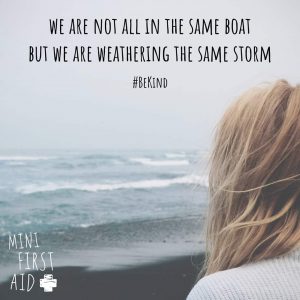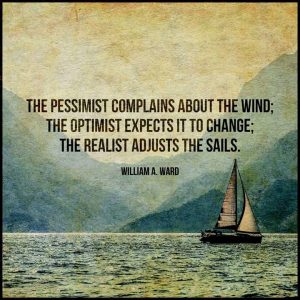 A lot of students are asking this right now. I don’t have a physical office for students to come and see me anymore so this is my attempt to reach out to try to help those of you who are worried.
A lot of students are asking this right now. I don’t have a physical office for students to come and see me anymore so this is my attempt to reach out to try to help those of you who are worried.
Students are understandably often stressed about their studies to begin with. Current uncertainty in terms of when face to face teaching will resume and exactly what will happen with assessments will only exacerbate stress levels. It is natural for everyone to be afraid of the virus and its long term impact.
But will COVID-19 ruin your degree? … No. Not unless you allow it to.
Here’s why:
One simple but surprisingly effective test for life events: will this matter in 10 years?
If you are unfortunate enough to lose someone you love to COVID-19 then of course it will matter in 10 years. It will matter for the rest of your life. That kind of pain doesn’t go away, although you do learn to live with it, sometimes surprisingly well, sometimes with more difficulty.
For those who fear that a few months of lockdown with no face to face teaching will matter in 10 years – no. It won’t even matter in 5 years – not unless you let it. We need to take some responsibility for ourselves. Tutors are really important but they are not the primary determining factor in your studies. You are.
COVID-19 doesn’t affect everyone equally but it has a potential impact on everyone.
 Education is a process based on the student’s academic ability and the work that they put in to their studies. External factors like access to tutors and books or online resources are of course significant – good access to resources is a significant help but a temporary lack of such resources need not have a permanent impact on your studies.
Education is a process based on the student’s academic ability and the work that they put in to their studies. External factors like access to tutors and books or online resources are of course significant – good access to resources is a significant help but a temporary lack of such resources need not have a permanent impact on your studies.
Living in crisis while studying is sadly not a new phenomenon. Students have been studying successfully for centuries while going through all manner of crises, in terms of health, bereavement, divorce or finance.
In ‘normal’ times I have taught students who have been successful in their degrees in spite of chronic health problems, divorce, unplanned pregnancy, domestic abuse, bereavement. Their challenges were personal, hidden, often largely unsupported. But they kept going and they got their degrees. Occasionally they had to take longer than they had planned or they didn’t get the degree result that they had hoped for but they achieved their degrees and went on to start their careers.
The one huge difference is that this crisis is universal. Coronavirus 2 affects everyone – not just in our individual countries but the whole world. One of the few good things about this awful virus is that every individual and institution has to be aware of it, to find a way through it. You don’t have to explain COVID to your tutors or your boss – they know – allowances are being made and strategies developed. Education, like every other part of society, is having to adapt, to find ways forward. Unlike personal crises, COVID will not simply affect you while others carry on with the advantage of living in a non COVID world.
We all know that the world has never been fair and the academic world reflects that. Someone always has an advantage, be it better health, more books, a more supportive family, a better living situation. Out of interest some of the students who appear to be privileged have much more difficult lives than they appear to. They may look very healthy but have a chronic health condition that isn’t obvious to others, or they may be living with a mental health problem. Their family may be very well off but refuse to help them to buy books or a safe living environment.
I don’t want to appear to minimise the problems for students who don’t have access to libraries or the internet. These are really important resources and lack of access is a big problem. Not being one of the lucky ones does make studying harder but it doesn’t make it impossible.
Focus on what you can do rather than on what you can’t.
Think about what you can and can’t control then do what you can about the things you can control.
We all need to ask ourselves, “What is my job here?”
No-one can control the virus but we can all do our best to minimise its spread. Researchers, doctors and nurses are doing their jobs quite brilliantly for us. What they need from us is for us to control our own behaviour so that we keep ourselves and everyone else as safe as possible. That is our job.
The ‘big’ things will be decided by governments; educational institutions will decide how to plan for their students. Your job as a student is to find out what the plans are and follow them, to continue your studies and to prepare for when things feel a bit more normal.
Human beings naturally crave ‘normal’. We don’t like change. But we all have to get used to the fact that the virus has changed things so we need to start working out ‘a new normal’. This will take time but it’s amazing how much has been achieved in so many areas in the few short months so far.
Find out what you can from your University about what is happening, what their plan is. Remember that it is not your job to come up with a plan – you do not have the responsibility of finding solutions which are as fair and workable as possible. Those who are taking these difficult decisions do so on the basis of considerable experience and in discussion with others, generally in cross-disciplinary teams: academics from different subjects, IT professionals, administrators. They are working things out for you to ensure that the system is as fair as it can be even in the wake of COVID.
Reading and writing will keep your mind alert and keep you in the habit of analysing things. You won’t be able to access everything that might help you in your studies so make the best use you can of the resources available to you.
 Do the next right thing.
Do the next right thing.
If in doubt, just do the next right thing – look at what you can do (however limited) and do it. Lots of small steps really do add up to something significant. You will also feel better if you focus on what you can do rather than on what you can’t.
Please don’t underestimate the significance of lots of small steps.
Read – do what you know will help you to improve your study and writing skills, to improve your subject knowledge. Don’t try to do too much and cover too wide an area – you need to focus on what is relevant to your area of study.
Get some exercise, in the fresh air if possible – even 10 minute walks can have a really helpful effect, particularly if you walk briskly so that you become slightly out of breath (please don’t do that without discussing it with your doctor if you have health issues!)
Rest – rest your body by doing what you can to sleep properly; rest your mind by trying to find a bit of quiet space during the day.
Breathe! Simply breathing deeply and taking the time to exhale as far as you can really does help. 5 minutes will make an enormous difference but in fact even taking 3 deep breaths (and exhaling!) will help more than you expect it to. Simple exercise: breathe in for a count of 3, hold your breath for 3, exhale for 3. Repeat but for a count of 4, then 5.
If your brain refuses to allow you to rest you might find that listening to an audio book will help. A good story will give your brain something to focus on without having to work too hard.
Audible is giving free access to classic stories: you don’t need to sign up for anything or log in. You just go to https://stories.audible.com/start-listen and see what’s on offer. At the time of writing they have a Literary Classics section, with texts such as Frankenstein, Jane Eyre, Pride and Prejudice and Wuthering Heights and adventure classics like Moby Dick and Call of the Wild. They have dramatisations of Shakespeare and popular fiction such as the Harry Potter series. Audible also offers a free trial of its services where you can have any book to keep. To do this you will need to sign up and then cancel if you don’t want to continue to the paid subscription. They allow you to keep the audio book either way. Audiobooks is currently offering a two book free trial. There are other sites which promise free audio books but do please be careful – some may be legitimate but others are clearly scams.
This too shall pass.
People close to me are in the ‘extremely vulnerable’ category when it comes to COVID and so we are focusing simply on doing what we can to keep them alive. What is an inconvenience for some people is terrifying even deadly for others. I really do understand that but my role is to speak as a tutor, to try to help people through the impact of COVID on their studies.
Give yourself credit for having got this far in your life, do the best you can each day, try to set realistic and achievable goals and be prepared to adapt them when you need to. Education is really important but it is not the most important thing in life.
The good news is that while COVID may well make life more difficult for you no, it will not wreck your education. I know that. I know it from personal experience missing a lot of school due to persistent ill health and I know it from decades of teaching students who, like me, got their degrees in spite of health and other issues.
There is so much uncertainty in this world at the moment due to the pandemic but from an educational standpoint, please be encouraged. You may have to do things differently (online learning rather than face to face), you may have to do a lot more work on your own (and that is tough), you may feel lonely and that you are destined to fail. But in this one area of life – your education – COVID is not big enough to wreck your future.
Stay safe everyone. I wish you and your families good health and safety in these challenging times.
Beth